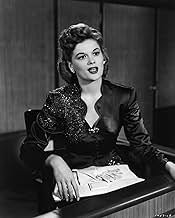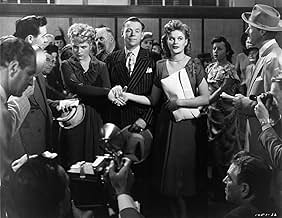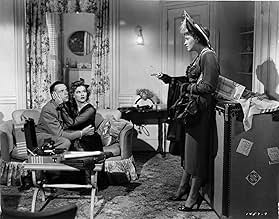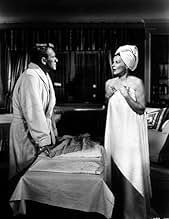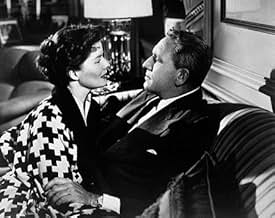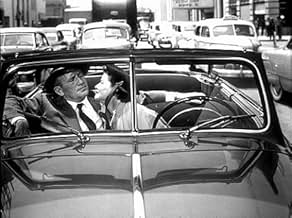NOTE IMDb
7,4/10
24 k
MA NOTE
Les tensions familiales et professionnelles augmentent lorsqu'un mari et une femme travaillent comme avocats opposés dans une affaire impliquant une femme qui a tiré sur son mari.Les tensions familiales et professionnelles augmentent lorsqu'un mari et une femme travaillent comme avocats opposés dans une affaire impliquant une femme qui a tiré sur son mari.Les tensions familiales et professionnelles augmentent lorsqu'un mari et une femme travaillent comme avocats opposés dans une affaire impliquant une femme qui a tiré sur son mari.
- Réalisation
- Scénario
- Casting principal
- Nommé pour 1 Oscar
- 3 victoires et 5 nominations au total
Edward Andrews
- Kip's neighbor
- (non crédité)
Bonnie Bannon
- Woman in Courtroom
- (non crédité)
Charles Bastin
- Young District Attorney
- (non crédité)
Harry Baum
- Commuter
- (non crédité)
Joseph E. Bernard
- Mr. Bonner - Adam's Father
- (non crédité)
Avis à la une
'Adam's Rib' is arguably the greatest Tracy-Hepburn film, and is certainly the most popular of their teamings. Brightly written (by the husband and wife team of Ruth Gordon and Garson Kanin), it takes the premise of a wife (the sparkling Judy Holliday, in her film debut) on trial for shooting her unfaithful husband (Tom Ewell, establishing himself in the kind of role he'd reprise in The Seven-Year Itch), and turns it into a forum of the sexual values and standards of the 1940s, and a showcase for the fabulous Tracy and Hepburn, who were were never better than as the battling D.A. and defense attorney. In the courtroom and out, the love they share, and tweaking of each other's egos is a sheer joy to watch. That the story is also a knowing commentary about women's inequality under the law makes the film even more topical today, and doesn't reduce the film's enjoyment value at all. It is a VERY funny film, and can be enjoyed at MANY levels!
In addition to Holliday and Ewell, the supporting cast includes the terrific David Wayne as a smarmy songwriter-neighbor who covets Hepburn, and 'writes' the ditty 'Goodbye, Amanda' for her (actually composed by Cole Porter, Hepburn's character's name in the film was changed to Amanda, to fit the song!)
Among the many wonderful scenes of the film are the 'home movie', which accurately reflected much of Tracy and Hepburn's own relationship; the infamous massage scene ("I know a slap...!"); the circus 'Strong Woman', demonstrating that women can be as physically powerful as men by lifting the panicking Tracy over her head easily (in the middle of the courtroom!); the infamous licorice-gun confrontation as Tracy confronts Hepburn with Wayne; and Tracy's crying-on-demand revelation.
'Adam's Rib' is a film which never seems to age, but just gets better and better!
In addition to Holliday and Ewell, the supporting cast includes the terrific David Wayne as a smarmy songwriter-neighbor who covets Hepburn, and 'writes' the ditty 'Goodbye, Amanda' for her (actually composed by Cole Porter, Hepburn's character's name in the film was changed to Amanda, to fit the song!)
Among the many wonderful scenes of the film are the 'home movie', which accurately reflected much of Tracy and Hepburn's own relationship; the infamous massage scene ("I know a slap...!"); the circus 'Strong Woman', demonstrating that women can be as physically powerful as men by lifting the panicking Tracy over her head easily (in the middle of the courtroom!); the infamous licorice-gun confrontation as Tracy confronts Hepburn with Wayne; and Tracy's crying-on-demand revelation.
'Adam's Rib' is a film which never seems to age, but just gets better and better!
10Cinemayo
Spencer Tracy and Katharine Hepburn make fireworks in this cute film about a well-to-do married couple who both happen to be lawyers. Hepburn is a die-hard Woman's Rights supporter, so when a ditzy lady is charged with shooting her husband after catching him being unfaithful, Kate decides to take her case and defend her. The trouble is, old-fashioned husband Tracy is already penciled in as the prosecuting attorney. Let the Battle of the Sexes begin!
The script sets up a great opportunity to have Tracy and Hepburn sparring with one another during every phase of the trial, as well as at home every night after they've spent each day trying to outwit each other. As a comedy, there aren't any huge belly-laughs, but it's a charming enough little take on the differences between men and women which also manages to make the point that, in many ways, the sexes aren't really all that different when all is said and done.
**** out of ****
The script sets up a great opportunity to have Tracy and Hepburn sparring with one another during every phase of the trial, as well as at home every night after they've spent each day trying to outwit each other. As a comedy, there aren't any huge belly-laughs, but it's a charming enough little take on the differences between men and women which also manages to make the point that, in many ways, the sexes aren't really all that different when all is said and done.
**** out of ****
Adam's Rib (George Cukor, 1949) is often hailed as the best "battle-of-the-sexes" comedy on celluloid, but it's beset with the same problems as the bulk of these Tracy-Hepburn vehicles: dated social observation that's tricky to navigate today, a lack of laughs and dramatic sequences that are just too heavy. The leads are a blissfully married couple who clash when they take opposing sides in a murder trial: assistant DA Spence leads the prosecution of wronged wife Judy Holliday (who is magnificent), while crusading feminist Kate leaps to her defence. Holliday plugged philandering husband Tom Ewell, you see, then fired wildly around the flinching floozy he was nuzzling up to, Jean Hagen.
The acting is absolutely stunning - universally superb - and there's smart use of newspaper inserts and a puppet show motif, but the material is spotty and chunky, with humour arriving in slabs rather than being weaved through the narrative. Kudos to former stage star David Wayne (he played Og in the smash Broadway version of Finian's Rainbow) for being so formidably irritating as Hepburn's extremely camp confidante and suitor. His reading of Cole Porter's specially adapted song Farewell, Amanda is a rare moment of respite in a teeming sea of annoyance. Hepburn asked her favourite director, Cukor, to favour Holliday in the filming of their scenes and leaked stories to the press about Judy's revelatory performance enraging both the leads. The ploy was designed to land her apprentice the lead in the screen adaptation of Born Yesterday, which she had initiated on stage. It worked - and she took home the Best Actress Oscar the following year.
As for Adam's Rib, it's impressive and memorable but, despite all that, resolutely not a classic.
The acting is absolutely stunning - universally superb - and there's smart use of newspaper inserts and a puppet show motif, but the material is spotty and chunky, with humour arriving in slabs rather than being weaved through the narrative. Kudos to former stage star David Wayne (he played Og in the smash Broadway version of Finian's Rainbow) for being so formidably irritating as Hepburn's extremely camp confidante and suitor. His reading of Cole Porter's specially adapted song Farewell, Amanda is a rare moment of respite in a teeming sea of annoyance. Hepburn asked her favourite director, Cukor, to favour Holliday in the filming of their scenes and leaked stories to the press about Judy's revelatory performance enraging both the leads. The ploy was designed to land her apprentice the lead in the screen adaptation of Born Yesterday, which she had initiated on stage. It worked - and she took home the Best Actress Oscar the following year.
As for Adam's Rib, it's impressive and memorable but, despite all that, resolutely not a classic.
Sometimes in life, we experience the most embarrassing situations. But no matter how embarrassing these situations are, they can't possibly be as whacked-out as what the characters in "Adam's Rib" experience.
It all begins when Doris Attinger (Judy Holliday) shoots her husband Warren (Tom Ewell) after she finds him cheating on her. She is promptly arrested for attempted murder. High-priced lawyer Adam Bonner (Spencer Tracy) is assigned to represent Warren in court. However, Adam's wife Amanda (Katharine Hepburn) finds it despicable that a woman was arrested for punishing her unfaithful husband, and decides to represent Doris in court.
Well, as you can imagine, with husband and wife on opposite sides of the trial, things get a little crazy. It only makes sense that they can't help but maintain their spousal attitudes towards each other while in court (especially under the table). But even Amanda starts to find Adam unpleasant for defending Warren, and she plays a few tricks on him in court, namely with a very muscular woman.
One thing that you have to wonder after seeing a movie this good is: how did Ruth Gordon and Garson Kanin come up with such a great story? Well, the point is that they did. It focuses not only on sexism, but also on how the whole trial is affecting their marriage.
Anyway, the point is that in my opinion, "Adam's Rib" should have won Best Picture for 1949. Perfect.
It all begins when Doris Attinger (Judy Holliday) shoots her husband Warren (Tom Ewell) after she finds him cheating on her. She is promptly arrested for attempted murder. High-priced lawyer Adam Bonner (Spencer Tracy) is assigned to represent Warren in court. However, Adam's wife Amanda (Katharine Hepburn) finds it despicable that a woman was arrested for punishing her unfaithful husband, and decides to represent Doris in court.
Well, as you can imagine, with husband and wife on opposite sides of the trial, things get a little crazy. It only makes sense that they can't help but maintain their spousal attitudes towards each other while in court (especially under the table). But even Amanda starts to find Adam unpleasant for defending Warren, and she plays a few tricks on him in court, namely with a very muscular woman.
One thing that you have to wonder after seeing a movie this good is: how did Ruth Gordon and Garson Kanin come up with such a great story? Well, the point is that they did. It focuses not only on sexism, but also on how the whole trial is affecting their marriage.
Anyway, the point is that in my opinion, "Adam's Rib" should have won Best Picture for 1949. Perfect.
(Note: Over 500 of my movie reviews are now available in my book "Cut to the Chaise Lounge or I Can't Believe I Swallowed the Remote!" Get it at Amazon.)
Two New York lawyers, husband Adam Bonner (Spencer Tracy) and wife Amanda Bonner (Katharine Hepburn), work out the marital tension and fight the sexual wars in the courtroom on opposite sides of a wife (Judy Holliday) shoots cheating husband (Tom Ewell) case. Adam's masculinity is seemingly challenged and his sense of justice offended by his wife's insistence on showing how smart she is while furthering her feminist agenda at the expense of the law. Will their public confrontation destroy their marriage, or will it ultimately make the bond stronger?
This still plays mainly because of the charisma of Hepburn and Tracy and the fine chemistry they create together. The script by Garson Kanin and Ruth Gordon is shallow and profound by turns, yet ultimately witty and pleasing. Judy Holliday as the lower middle-class Doris Attinger (on her way to her signature role in Born Yesterday (1950)) and David Wayne, as the song-writing neighbor who adores Amanda, shine in supporting roles. George Cukor's direction is clear, crisp and always focused. In the end we can see that Adam can be as feminine as Amanda can be masculine. The bit where Tracy cries real tears to win her back and then tells her, "We all have our tricks" is classic. It's his clever answer to her outrageous courtroom theatrics. Memorable as it illuminates their contrasting personalities is the early scene where the unsophisticated Doris is interviewed by Yale law school grad Amanda.
As a political movie, was Adam's Rib ahead of its time as a vehicle for feminist expression, or was it just another apology for male chauvinism, or was it balanced and fair? I'll give you a hint: the title is ironic. One of the things that made the Tracy/Hepburn romance work so well for so long was the creative balance they maintained in the battle of the sexes. The script by Kanin and Gordon carefully continues that profoundly true equilibrium.
Two New York lawyers, husband Adam Bonner (Spencer Tracy) and wife Amanda Bonner (Katharine Hepburn), work out the marital tension and fight the sexual wars in the courtroom on opposite sides of a wife (Judy Holliday) shoots cheating husband (Tom Ewell) case. Adam's masculinity is seemingly challenged and his sense of justice offended by his wife's insistence on showing how smart she is while furthering her feminist agenda at the expense of the law. Will their public confrontation destroy their marriage, or will it ultimately make the bond stronger?
This still plays mainly because of the charisma of Hepburn and Tracy and the fine chemistry they create together. The script by Garson Kanin and Ruth Gordon is shallow and profound by turns, yet ultimately witty and pleasing. Judy Holliday as the lower middle-class Doris Attinger (on her way to her signature role in Born Yesterday (1950)) and David Wayne, as the song-writing neighbor who adores Amanda, shine in supporting roles. George Cukor's direction is clear, crisp and always focused. In the end we can see that Adam can be as feminine as Amanda can be masculine. The bit where Tracy cries real tears to win her back and then tells her, "We all have our tricks" is classic. It's his clever answer to her outrageous courtroom theatrics. Memorable as it illuminates their contrasting personalities is the early scene where the unsophisticated Doris is interviewed by Yale law school grad Amanda.
As a political movie, was Adam's Rib ahead of its time as a vehicle for feminist expression, or was it just another apology for male chauvinism, or was it balanced and fair? I'll give you a hint: the title is ironic. One of the things that made the Tracy/Hepburn romance work so well for so long was the creative balance they maintained in the battle of the sexes. The script by Kanin and Gordon carefully continues that profoundly true equilibrium.
Le saviez-vous
- AnecdotesInspired by the real-life story of husband-and-wife lawyers William Dwight Whitney and Dorothy Whitney, who represented Raymond Massey and his ex-wife Adrianne Allen in their divorce. After the Massey divorce was over, the Whitneys divorced each other and married the respective Masseys.
- GaffesDuring the trial proceedings, a Black juror was in the first row, but the trial scene following the argument between Amanda and Adam where Adam walks out of the home, the jury makeup has now changed and the Black juror is not present. However the following day when court resumes for the jury verdict, the Black juror is back in the jury box.
- Crédits fousOpening credits are little curtains that go up and down, on a stage in a performance hall.
- Versions alternativesAlso available in a computer colorized version.
- ConnexionsEdited into Hollywood: The Dream Factory (1972)
- Bandes originalesFarewell, Amanda
(1949)
Music and Lyrics by Cole Porter
Played during the opening credits and often in the score
Sung by David Wayne (uncredited), accompanying himself on the piano
Reprised by the voice of Frank Sinatra (uncredited) on the radio
Whistled by Katharine Hepburn (uncredited)
Sung a cappella by Spencer Tracy (uncredited)
Meilleurs choix
Connectez-vous pour évaluer et suivre la liste de favoris afin de recevoir des recommandations personnalisées
Détails
- Durée
- 1h 41min(101 min)
- Couleur
- Rapport de forme
- 1.37 : 1
Contribuer à cette page
Suggérer une modification ou ajouter du contenu manquant



